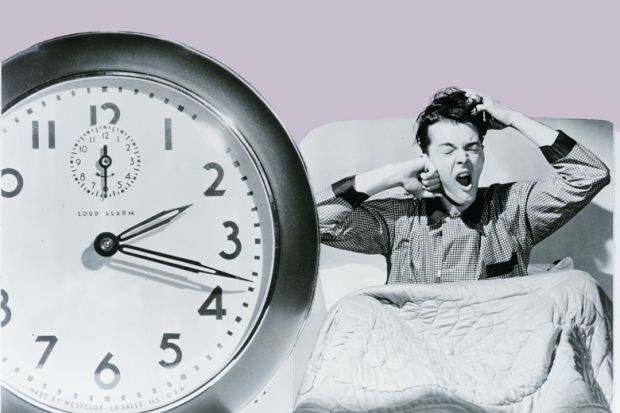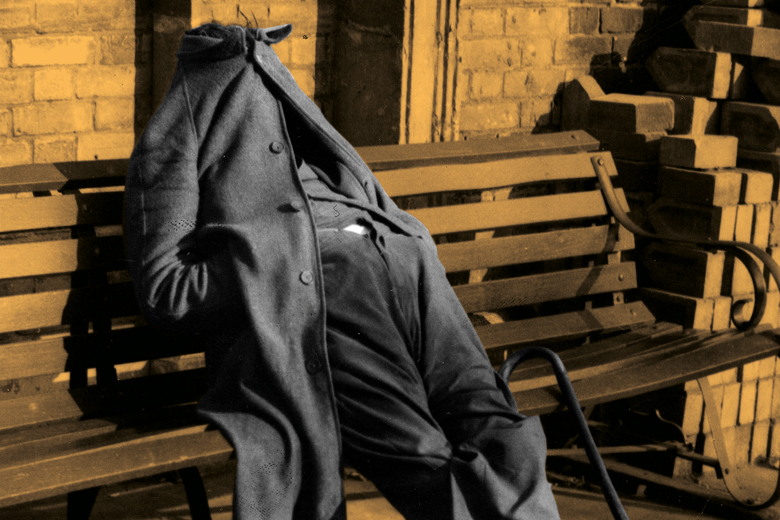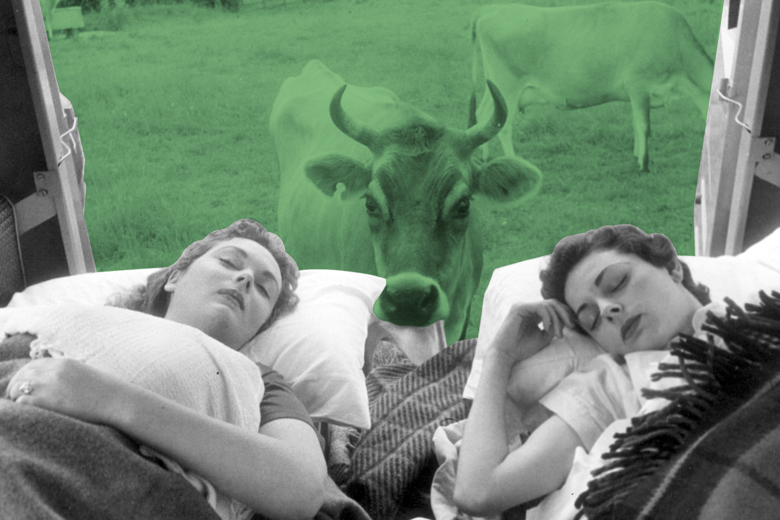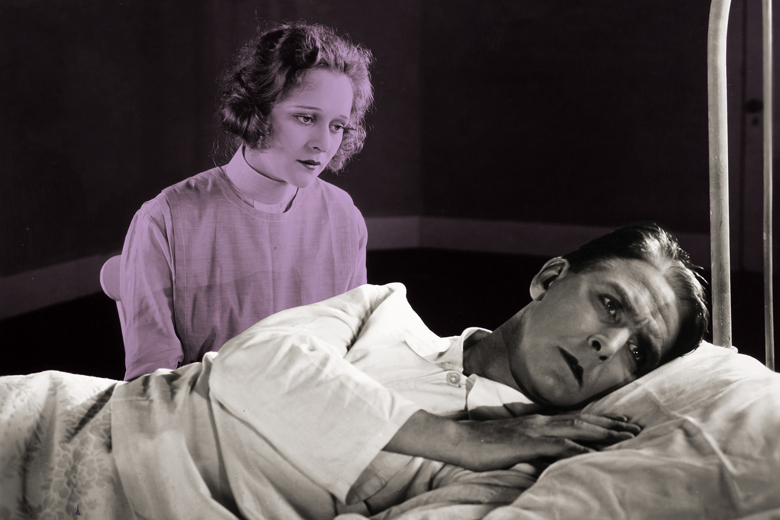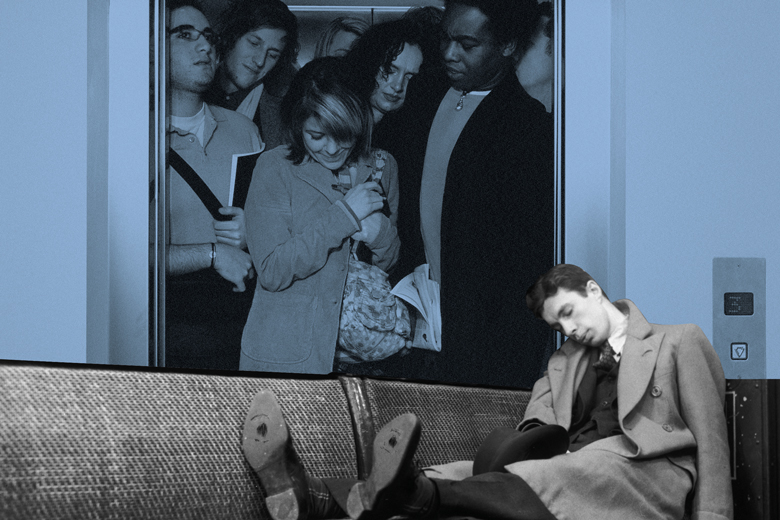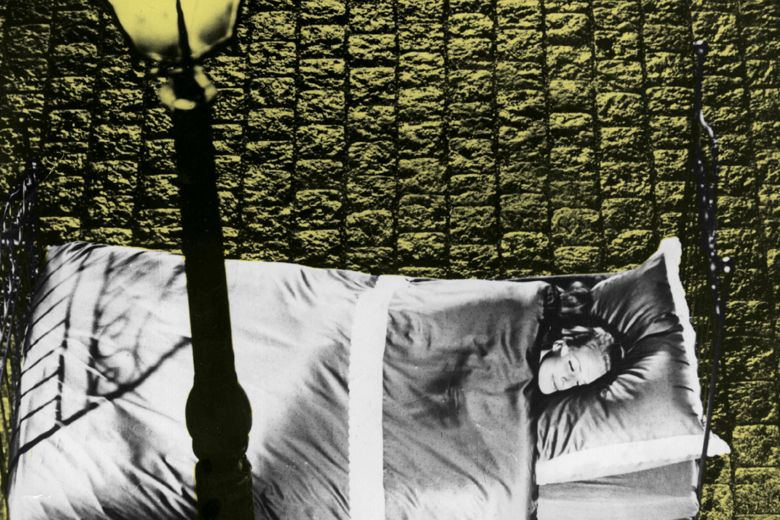Sleep is essential to maintaining physical and mental health. But a good night’s slumber can be hard to achieve – especially when your brain takes lights out as a cue to mull over the day’s problems or to worry about tomorrow. Here, academics and professional staff reveal what keeps them awake at night
The educationalist
It’s people. It’s always the people
Oh, sure, I worry about all the usual things. The crisis of the humanities; the threat of being restructured – again; quality assurance regimes that encourage disciplinary conformity and stifle innovation.
But what keeps me awake at night is people. It’s always people.
I worry about the undergraduate who hasn’t turned up for the past three weeks; the doctoral student who struggles to write coherent sentences; the early career researcher who isn’t publishing enough to get promoted; the staff member undergoing cancer treatment. I agonise over the comments of unjust peer reviewers, truculent students, backbiting colleagues. I replay difficult conversations in my head and anticipate unpleasant encounters.
The common themes in these ruminations are human frailty, uncertainty and injustice. In my more lucid moments, I remind myself that higher education exists not to crush people but to empower them, and I celebrate the successes of my students and colleagues. A friend of mine recently received a highly coveted national honour, thanks not only to her own brilliance but also to the cadre of individual well-wishers who wrote heartfelt testimonials in support of her nomination. She teaches in a department that is torn apart by infighting, in which she simply refuses to engage. Sometimes the good guys win.
But sometimes they don’t. For example, I often find myself obsessing about the bad behaviour of overbearing colleagues who bully others and brook no opposition. I privately refer to such people as poodles, in homage to Goethe’s Faust, in which Mephistopheles first appears to Faust in the form of a large black hunting dog. Goethe’s poodle is a sinister beast, not a circus performer or fluffy pet. All the same, the mental image of these minor demons as grumpy wet poodles helps me to diffuse some of the frustration and anger I feel when I’m sitting in a meeting listening to the squelch of good ideas getting stomped on.
My husband and I have an agreement: there are certain people I’m forbidden to mention in the bedroom. Nothing kills romance faster or deader than a conversation about university politics. And so, when I wake up at night with my mind whirring, I try to stick to the same rule. The people I care about can share the warmth of my blanket; but there’s no place for poodles in my bed.
Helen Sword is professor and director of the Centre for Learning and Research in Higher Education at the University of Auckland.

The immunologist
Has Trump sleep-tweeted us into a global war, and will it end my career?
I know that I am not the only insomniac academic. What I don’t know is how much of that is attributable to the job. The relentless nature of higher education surely doesn’t help, seeping into all aspects of your existence. This can be good when your subconscious brain solves a problem that your conscious brain has grappled with unsuccessfully, but it can be a problem when you are lying there in the small hours thinking about what to say in a magazine article about sleeplessness.
My nocturnal cycle goes: fall asleep; get woken up; get stuck in semi-coherent loop of thoughts; fail to resettle; read a book; eventually go back to sleep. The awakening usually happens around 2am. The only slight variation is its cause: in the week of writing, it has so far been son, son, daughter, thunder, daughter, son, chicken. As for the thought loops, these usually revolve around:
Operational issues: Has the liquid nitrogen tank failed and all my samples defrosted, ending my career?
Professional issues: Will my next grant be rejected? And what about the one after the one after that? If they are, will it end my career?
Global issues: Has Donald Trump sleep-tweeted us into a global war, and will it end my career?
Sporting issues: Has the England cricket team had another batting collapse, and whose international careers should be ended on that account? (Luckily, this loop is quite seasonal.)
If my sleeplessness were caused by having amazing revelations about immunology, at least the time would not feel wasted. Instead, I fret about things beyond my control. On the plus side, I suppose it at least indicates how much I care about my job (and cricket).
At this point, it would be nice to give some advice, but if I knew how to sleep better, I wouldn’t be writing this article. If I had to hazard a guess, it would probably be a combination of more routine, more exercise, less caffeine, less booze, less cheese, no video games, no children and no pets. But what kind of life would that be?
I guess I’ll take a bit of insomnia in exchange for all the benefits of a career in academia…if I could only remember what those are.
John Tregoning is a senior lecturer in the mucosal infection and immunity section of virology at Imperial College London.
The PhD candidate
I’m unsure about staking my future well‑being on a career trajectory that I will have so little control over
As someone at the end of their PhD, I am kept awake at night by one question: stick or twist? Keep pursuing a career in academia or find a job elsewhere? I am still obsessed by my subject, but my doctoral experience has made me think twice before committing to the academic track.
Aside from my love for materials science and engineering, a big motivation for me to stay is the thought of helping to redress academic engineering’s chronic lack of gender diversity.
In the UK in 2015-16, there were fewer than 5,000 female academics in engineering and technology, compared with more than 19,000 men, according to the Higher Education Statistics Agency. Through my public engagement work, I have seen the difference that positive role models can make, and the presence and support of other women in my own department has benefited me hugely.
On the other hand, the fight for diversity can be debilitating, and everything feels stacked against you. Peering up the academic career ladder from the bottom rung, all I see are old boy networks, conflicts of interest and fierce competition standing between me and the next level, at every level, always. I already feel as though I have missed out on opportunities because I didn’t know the right people, and this is immensely frustrating. It makes me unsure about staking my future well-being on a career trajectory that I will have so little control over, and which has already taken a toll on my mental health. Perhaps it would be better to forge a career in public engagement instead.
And yet. The visible, high-profile scientists and engineers in the media – those with enough exposure to influence both institutional policies and public perceptions – are almost always senior academics. This is changing slowly thanks to the growth in online media platforms, the democratisation of information and a burgeoning professional science communication community. But, for a sector so stuck in its ways, I wonder whether the stigma against people who aren’t professors will ever really go away. So, stick or twist? Maybe one of these sleepless nights I will work it out.
Anna Ploszajski is a materials scientist studying for an engineering doctorate in hydrogen storage materials at UCL. She was recently named a 2017 Royal Academy of Engineering Young Engineer of the Year.
The economist
What worries me most is that with Brexit, we’re shifting our course away from cosmopolitanism
As an economist, but also an economic historian, it isn’t so much the details of Brexit that keep me awake at night; it’s what it signifies more generally.
The UK is moving backwards. Not just in terms of trade and international cooperation, which is dangerous enough. What worries me most is that we’re shifting our course away from cosmopolitanism.
Disturbed from my slumber, I can’t help but think about what has put the “great” in Great Britain. Why was the UK the first country to have an Industrial Revolution? How did it transform from being – for millennia – nothing more than a backwater into one of the world’s richest economies? The answer is not investment, education or even science and technology. It was establishing a free and open society.
In academia, it’s easy to take that kind of society for granted. We’re used to cherishing individual differences. We’re always open to change. We see the benefits in terms of intellectual advances that make our lives longer, less arduous and more fulfilling. Yet there are those who seek a very different world. As Lord Ashcroft’s polls show, more than 70 per cent of those who see the Green movement, feminism, the internet, multiculturalism and immigration as a “force for ill” are Brexiteers.
When the case for Brexit was being made, what mattered was the British state “taking back control”. To hell with the freedoms of individuals to cross borders and to seek out new opportunities in Europe, whether for work, study or personal reasons. And to hell with the human relationships – current and future – that may be constrained by country of birth.
Lying in bed, I’m reminded that the real struggle is – to paraphrase John Maynard Keynes – between a view of the world termed liberalism and that other view that thinks in terms of power, prestige, national glory, the imposition of a culture and hereditary or racial prejudice.
That so many people have embraced this view is a blow to the utopia that academics fight to create. As the UK’s March 2019 exit date draws closer, however, it won’t be only economists having sleepless nights – everyone with an attachment to a prosperous and liberal society will be restlessly tossing and turning.
Victoria Bateman is a lecturer and fellow in economics at Gonville and Caius College, Cambridge.
The social scientist
I’ve been experiencing growing unease about how social media platforms compel me to feel always on
Three things tend to keep me awake at night; they are (in no particular order) Facebook, Twitter and Instagram. That’s right, I have social media angst. But I’m not a smartphone-wielding tween who covets likes-and-comments validation – and I’ve (mostly) given up on scouting insta-worthy photo backdrops. Instead, I’ve been experiencing growing unease about how these platforms compel me to feel always on. I’m acutely aware of how potential “audiences” might respond to my “content”.
Like many, my connections across various social networks are motley: friends and family, colleagues and mentors, former undergraduates and current postgraduate students, even former research informants. And they’re all privy to the same digital “me” – a reality that scholars call “context collapse”, which demands more deft performative acrobatics than I’d ever need to negotiate face to face.
Far too often, I find myself deliberating about the consequences of my online activity: an expressly political tweet might earn reproach from a conservative student. Industry critiques might alienate interview recruits. Too many vacation photos could suggest to tenure reviewers that I don’t take my work seriously. On the other hand, too much self-promotion is a sign of braggadocio. And some people apparently believe that there is such a thing as too many cat photos.
All this may sound hyperbolic, but my fears are rooted in a kernel of truth. The fallout of a tactless tweet or thoughtless Facebook post can be dire: faculty get fired; university reputations are derailed.
I also worry about the pressure such stakes impose on my students. Against the backdrop of a ruthless job market, today’s youth are socialised to be hyper-vigilant about their online self-presentation. Their image maintenance goes far beyond deleting photos of keg stands: they feel compelled to maintain an ever-employable persona. What does it say about our social worth when we are only as good as our last tweet?
Perhaps I’m too sensitive – or just excessively self-aware. But I guess that’s expected given that both my research and teaching explore social media and society. And so, waking from fitful sleep, I reach for my steady bedside companion – my well-worn iPhone – to reassure myself that my last post was undoubtedly SFW [safe for work]. After all, it was only about my pet ducks: there’s not a cat in sight.
Brooke Erin Duffy is an assistant professor at Cornell University and the author of (Not) Getting Paid to Do What You Love: Gender, Social Media, and Aspirational Work (2017).
The philosophy researcher
I’m kept awake by the inevitable exhaustibility of distinctions
The most famous mental crisis in the history of philosophy was precipitated by the fear that the world would run out of new music.
John Stuart Mill was haunted by the thought of the “exhaustibility of musical combinations”, and worried that nearly all the beautiful ones had already been discovered.
He was wrong, of course – as everyone from Schoenberg to Sheeran has gone on to show. And Mill recovered, aided in part by his passion for philosophy. But I’m kept awake by a looming extinction that strikes at the heart of Mill’s subject and mine: the inevitable exhaustibility of distinctions.
Philosophers have always sifted the contents of the cosmos, and acclaim accompanies those with a perceptive eye for difference. The tools of their trade vary, however. Historically, things were simple: an Aristotelian axe split form from matter; a scholastic scalpel sliced essences from accidents. The modern conceptual production line, however, goes much further, frantically sieving intensions from extensions, uses from mentions, and the de dicto from the de re. Whole mini-industries sprawl around these distinctions. Analogies and thought experiments (the conceptual precariat) achieve momentary fame in the service of ideas of fleeting significance, and younger philosophers fantasise about having an eponymous distinction: the equivalent of an astronomer’s comet or a botanist’s elusive orchid.
Yet the conceptual landscape has been scanned for centuries, its wildlands charted comprehensively. What happens when these thought expeditions are finally over and the taxonomical cabinet is full? What happens when not even a graphene razor can tease one micron-thin idea from another? What then? My colleagues and I will be de facto, if not de jure, redundant: neither necessary nor sufficient.
Ironically, perhaps Mill himself can offer some solace. His infamous distinction between higher and lower pleasures could finally have its moment when philosophy begins to run out of road and we turn towards more immediate sources of satisfaction. Better still, the search for gratification, as we slink hungrily to the pub, might yield new sources of inspiration. Philosophical consultation for the hospitality industry, anyone? There’s nothing worse than ordering a pie only to be served a stew-with-a‑lid, for example. Perhaps the UK High Court was wrong about the non-crisp-like essence of the Pringle. And maybe, just maybe, for all their sponginess, their orange filling and their inconvenient name, Jaffa Cakes really are biscuits…
Luke Brunning is a British Academy research fellow in the philosophy faculty at the University of Oxford and a non-stipendiary junior research fellow at Corpus Christi College, Oxford.
The estates manager
Can we place another 100 economics students in the space available? Will the lifts fail at 2am on Sunday?
Of the many problems taxing the minds of university estates managers late at night, the biggest is space – or the apparent lack of it.
Our admissions team may be pleased when undergraduate recruitment is broadly on target, but this causes us growing anxiety as it becomes clear that, in some subject areas, we will overshoot again – to compensate for challenges elsewhere. Can we place another 100 economics students in the space available? Is that unused basement really only in need of a lick of paint? And, if we can work our magic, what impact will it have on the timetable, and on those stressed individuals charged with making it work?
Most of our intake – quite reasonably – expect us to provide somewhere to live, and balancing the bed space numbers is always a fabulous juggling act. It is usually exacerbated by our annual renovation programme, which might seek to squeeze 20 weeks of work into the 10 weeks available over the summer. Insomnia can be the result of furniture suppliers who cannot meet delivery deadlines, or the propensity of the Naples-based lift manufacturer to shut down entirely in August.
This year has had the added complication of the Grenfell Tower fire, which obliged all university estates and residences teams to review their construction, risk-assessment and evacuation plans. This extends to all those partnership residences built by a host of developers. My team spent much of the summer in the company of the local fire service, the city council and various safety experts as we sought to provide the necessary levels of assurance to students, staff and trustees alike.
The activities of our student body also disturb my sleep from time to time. Our security team’s weekend reports can make for hair-raising reading, although the staff seem to do a fine job of rescuing students who have established the point of failure of our older lifts at 2am on a Sunday.
Then there were the ingenious science students who, earlier this year, created a highly explosive substance in a research lab. Thanks to the combined efforts of the police and the bomb squad, it was detonated in a controlled way, but it still blew a large hole in our flagship gardens. What fun we had on that wet Friday evening – although our neighbours were clearly not amused by the multiple road closures and the apparent military takeover of one of the city’s more affluent neighbourhoods. More worryingly, most of the local residents seemed to have the estate director’s email address as a first point of reference.
All of which leaves precious little time to worry about asbestos discoveries, post-Brexit inflation, lack of capacity in the local construction market, staff retention, IT problems and a host of other issues that, instead, play on an estate manager’s mind in the dead of night.
Patrick Finch is bursar and director of estates at the University of Bristol.
The union member
Will our v-c continue resisting decades of social progress by refusing to give casual staff the sick leave they deserve?
What keeps me awake at night is the thing that stops me getting to bed in the first place – work. Everyone knows that there just aren’t enough hours in the day to get all those lectures and articles written, all those essays marked and all those papers reviewed.
But in my case, another reason I burn the midnight oil is that I have to spend so much of the day trying to defend what I see as core values of our profession. I work at the University of Sydney, a typical example of the kind of corporate institution that business and government want to see.
Academics’ typical preference for nuance mustn’t stop us from acknowledging the reality: working at such institutions often seems like a protracted war – sometimes hot, sometimes cold – between management and staff and students. I’ve reached the conclusion that doing our bit in this war is our key intellectual and political responsibility as academics – and that trade union activity is the only way to do so effectively.
Fortunately, once I finally turn in, I’m a good sleeper. But if I weren’t, there’d be plenty of scope to fret over what management might do next. Will they continue to empty out lecture theatres by putting teaching online? Will they raise the research “output” requirements again so that we academics are suddenly told we’re underperforming and deprived of the right to research? What essential aspect of our work will they next try to obstruct?
But what most threatens my sleep pattern is whether our vice-chancellor (salary package: A$1.4 million, about £815,000) is really going to keep on resisting decades of social progress by refusing to give our legion of casual staff the sick leave that they badly need and greatly deserve.
Casualisation is not a joke. Few of us here have forgotten the case of our casual colleague (and, in many cases, friend) for whom, last year, it all got too much, prompting him to take his own life.
Casuals experience the brunt of the managers’ university. But this is a university that would make everyone’s position casual if it could. It’s no overstatement to say that if you’re not losing sleep over this in one way or another, then you’re in trouble – whether you’re officially casual or not.
Nick Riemer is a senior lecturer in English at the University of Sydney.
The HR director
How can we recruit and retain the most talented staff post-Brexit? And how can I get a work-life balance?
What keeps me awake at night? Of course, there are the obvious things for a human resources director to fret about, such as how we can recruit and retain the most talented staff in an increasingly competitive international marketplace post-Brexit. In Scotland, we’ve had the added complexity of possible independence; I was previously asked by one potential international recruit: “What currency would you pay me in if I joined you?”
When I start musing on how I might better support our academics to pursue research and teaching in light of the research excellence framework and, now, the teaching excellence framework, insomnia follows without fail.
Lying in bed, it is also difficult to block out worries about bringing up young(ish) children while also helping ageing parents who need daily support. Am I striking the right work-life balance, I wonder? How can I find enough time to give my best to my family and to my work – and, on occasion, to look after myself? Regarding the last, the best strategy would be to just stop thinking and go to sleep. But it isn’t always that easy.
Sandra Heidinger is director of human resources at the University of Strathclyde and is chair of Universities Human Resources.
The pre-postdoctoral researcher
What disturbs my sleep is the question of where to settle down: my native Poland or the UK?
Tonight, like the night before,
I couldn’t sleep
And I dreamt of Nietzsche
When I did.
“You must become who you are!”
He scolded me
And the echo asked: how’s the PhD?
How’s the PhD?
When anxious thoughts keep me up at night, I write bad poems in Polish. The above translation is from one I wrote a few weeks ago. My PhD scholarship is now drawing to an end, and while it is very exciting to finally see the finish line of this marathon, I can’t help but feel anxious. I often think of myself as being in limbo. One part of this is the unavoidable tension of transitioning from grad student to postdoc, but the more troubling part – the one that disturbs my sleep – is choosing where to settle down.
The two obvious choices are my native Poland and the UK. The UK is where I did my PhD, where I learned to do social science and where there are many great institutions. But then there’s Brexit. And the pressures of neoliberal academia. And Brexit.
Poland has a few good universities and lots of potential for development. I feel I could make more of a difference there (my husband and my mother tend to agree). But job ads in my field are few and far between, and the criteria are often so narrow that they make me feel like a camel trying to pass through the eye of a needle. I recently filled in a 50-page application – yes, 50 pages – yet did not receive even a polite rejection letter. Why is it easier to apply for a job at a Russell Group institution than any Polish university?
And, as a counterbalance to the push of Brexit, there’s Polish politics. It’s very polarised. That’s what I should write, because living in the UK has taught me a bit about diplomacy. And I can’t help but wonder: if I wrote more, if I hinted at my own stance, would the needle’s eye become even narrower? Would I grow another hump? That’s how “polarised” things are back home.
Yet my heart is still set on going back. That’s the reason why, when insomnia drives me to write bad poems, they are in Polish.
Marta Natalia Wróblewska is a PhD candidate in applied linguistics at the University of Warwick.
The first-time lecturer
How can I live up to my self-imposed ideal of the perfect teacher?
This is my first semester teaching full time, and I want to do things perfectly. But how can I live up to that self-imposed ideal? That is what keeps me awake at night.
One problem is politics. I’m teaching environmentally focused science courses during a US administration that is not exactly the most environmentally friendly in history. Although I’m not overly concerned about ideological conflicts preventing learning in the classroom, I do wonder how they affect the students in other ways. World events, local news and community involvement are all likely influences on mental health, and, by extension, class assignments. Considering the types of courses that I’m teaching, students’ community and life experiences are an essential part of the learning experience, especially as a component of environmental understanding.
I strive to recognise my students as whole people, with jobs, families and physical frailty. But I agonise over how I can make my classroom even more inclusive. What can I do or say to help build the most supportive, community-based learning environment possible? What would that even look like? And which of the many professional development seminars and workshops should I prioritise given my grudging recognition that I can’t attend all of them?
Just like the fine wines that I probably can’t afford on my salary, I have to accept that my classes will improve over time, as my daily learning gains accumulate. But I’m not immune, either, to the effects of the constant political and environmental turmoil. It is a constant anxiety, and only adds to the pressure I am putting on myself to be the best teacher I can be. It is a wonder I get any sleep at all!
Rachel Yoho is a visiting assistant professor at Miami University in Oxford, Ohio.
POSTSCRIPT:
Print headline: In the wee small hours of the morning
Register to continue
Why register?
- Registration is free and only takes a moment
- Once registered, you can read 3 articles a month
- Sign up for our newsletter
Subscribe
Or subscribe for unlimited access to:
- Unlimited access to news, views, insights & reviews
- Digital editions
- Digital access to THE’s university and college rankings analysis
Already registered or a current subscriber?
